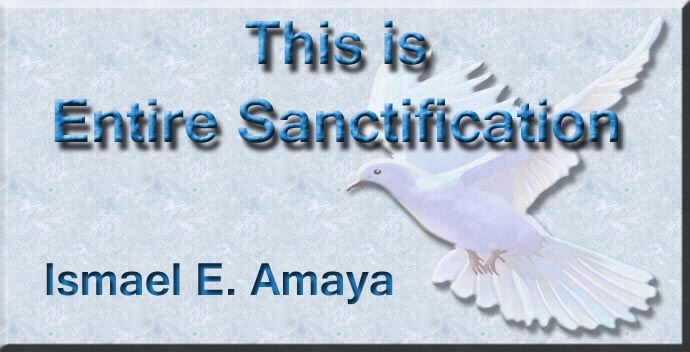
This is Entire Sanctification
By Ismael E. Amaya
Chapter 7
SeparationWhat is entire sanctification? Some say it is nothing more than consecration. But this is only one of the aspects of holiness. The original meaning of the word sanctification in the Old Testament was "separation" or "setting apart" to a sacred use or some special service for God. That is the reason why, especially in the Old Testament, this term is always related to ceremonial or ritual consecration of some person or thing. In the Bible we find that the term "holy" is applied to the ministers, priests, prophets, and apostles of God; that is, to persons who have been set apart from the secular tasks and have been consecrated for an exclusive service for God. "And ye shall be unto me a kingdom of priests, and an holy nation" (Exod. 19:6). "For thou art an holy people unto the Lord thy God" (Deut. 7:6). In these verses God is talking to the people of Israel through Moses just before giving them the law at Sinai. He tells them that they are those whom God has set apart as "priests" who were to serve Him. They were to be a nation, a people, united under the law that He would give them. They had been separated from all other nations on earth to be God's chosen people. They were to be a "holy" nation separated from all kinds of sin and idolatry characteristic of their heathen neighbors. In the seventh chapter of John, Christ prays for His disciples: "Sanctify them through thy truth: thy word is truth" (John 17:17). Adam Clarke, referring to these words, says: "This word [sanctify] has two meanings: 1. It signifies to consecrate, to separate from earth and common use, and to devote or dedicate to God and His service. 2. It signifies to make holy, or pure. The prayer of Christ may be understood in both these senses. He prayed- (1) That they may be fully consecrated to the work of the ministry, and separated from all worldly concerns; (2) That they might be holy, and patterns of all holiness to those to whom they announced the salvation of God." In some instances the people of Israel are called a "holy nation," meaning that they were God's chosen people and separated for Him. In the same sense, in the New Testament the Christians are called "saints" (holy), referring to them collectively. "But ye are a chosen generation, a royal priesthood, an holy nation, a peculiar people; that ye should shew forth the praises of him who hath called you out of darkness into his marvellous light" (I Pet. 2:9). All these titles had been given before in the Old Testament but only with reference to the Jewish people. Now, under the dispensation of the gospel, God's people, chosen and set apart, consisted of all those who believe in Christ, Jews or Gentiles, who have been washed and regenerated, and sanctified by the blood of the Lamb. These are the "saints" who often are mentioned in the Epistles of the New Testament. We also find in the Old Testament that the term holy is applied to things as well as to people -- all that belongs to God in a special way, such as the Temple, its various parts, its furnishings and utensils, and so forth. This is indicated in the following scriptures: "Then the devil taketh him up into the holy city, and setteth him on a pinnacle of the temple" (Matt. 4:5). "And they shall eat those things wherewith the atonement was made, to consecrate and to sanctify them: but a stranger shall not eat thereof, because they are holy" (Exod. 29:33). "Ye fools and blind: for whether is greater, the gold, or the temple that sanctifieth the gold?" (Matt. 23: 17) "If a man therefore purge himself from these, he shall be a vessel unto honour, sanctified, and meet for the master's use, and prepared unto every good work" (II Tim. 2: 21). The first verse refers to the "holy city," Jerusalem; the second verse, to the meat of the rams which was offered in sacrifice to God and which was "holy." The third refers to the gold which was presented as an offering in the Temple, which "sanctifieth" it; while the last verse speaks of a person who consecrates or "sanctifies" himself to the Lord's service. In these scriptures the idea of "separation" is clearly given. We also find that in the Old Testament the term "holy" is applied to the Sabbath as a day separated for God. "Remember the sabbath day, to keep it holy" (Exod. 20:8). When Moses said that God had made the Sabbath day holy, it meant that He had set it apart in order that the people of Israel would use it only for worship and religious exercises. In the same way we, as God's children, are a separated peoples -- separated from the sinful things of this world and separated unto God and His service. |
|
 |
 |
|
|
|
-
Site Navigation
 Home
Home What's New
What's New Bible
Bible Photos
Photos Hiking
Hiking E-Books
E-Books Genealogy
Genealogy Profile
Free Plug-ins You May Need
Profile
Free Plug-ins You May Need
 Get Java
Get Java.png) Get Flash
Get Flash Get 7-Zip
Get 7-Zip Get Acrobat Reader
Get Acrobat Reader Get TheWORD
Get TheWORD